Victim Stance Quotes & Sayings
Enjoy reading and share 10 famous quotes about Victim Stance with everyone.
Top Victim Stance Quotes
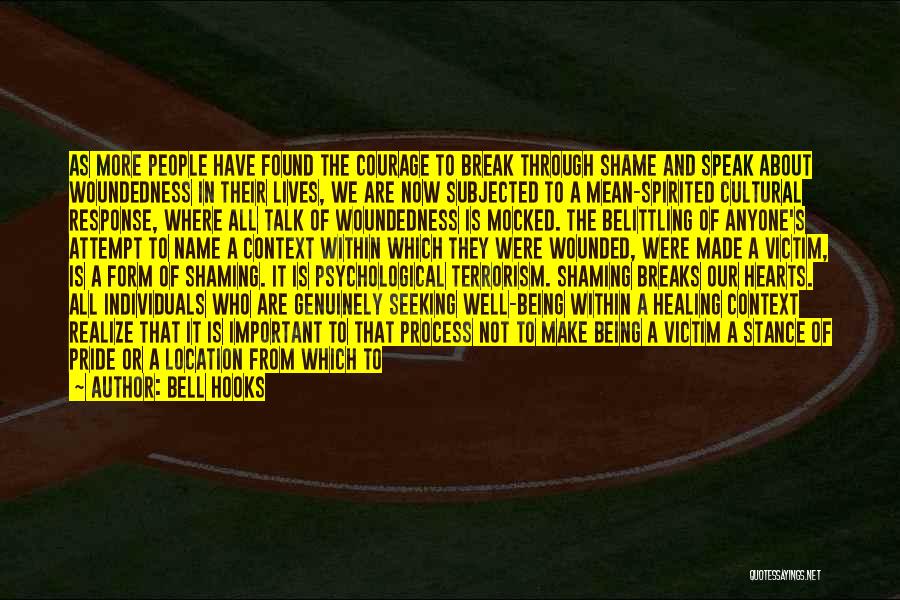
As more people have found the courage to break through shame and speak about woundedness in their lives, we are now subjected to a mean-spirited cultural response, where all talk of woundedness is mocked. The belittling of anyone's attempt to name a context within which they were wounded, were made a victim, is a form of shaming. It is psychological terrorism. Shaming breaks our hearts. All individuals who are genuinely seeking well-being within a healing context realize that it is important to that process not to make being a victim a stance of pride or a location from which to simply blame others. We need to speak our shame and our pain courageously in order to recover. Addressing woundedness is not about blaming others; however, it does allow individuals who have been, and are, hurt to insist on accountability and responsibility both from themselves and from those who were the agents of their suffering as well as those who bore witness. Constructive confrontation aids our healing. — Bell Hooks
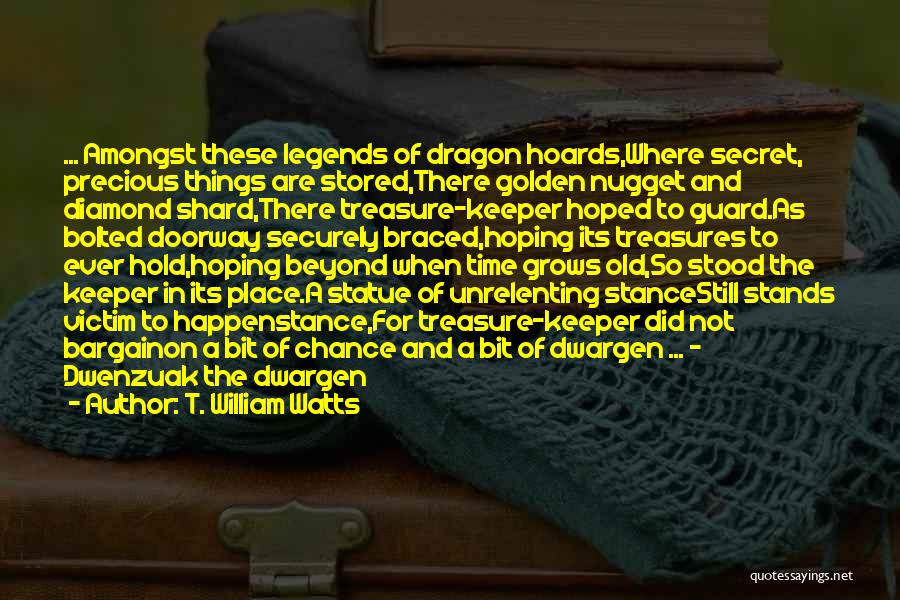
... Amongst these legends of dragon hoards,
Where secret, precious things are stored,
There golden nugget and diamond shard,
There treasure-keeper hoped to guard.
As bolted doorway securely braced,
hoping its treasures to ever hold,
hoping beyond when time grows old,
So stood the keeper in its place.
A statue of unrelenting stance
Still stands victim to happenstance,
For treasure-keeper did not bargain
on a bit of chance and a bit of dwargen ...
- Dwenzuak the dwargen — T. William Watts
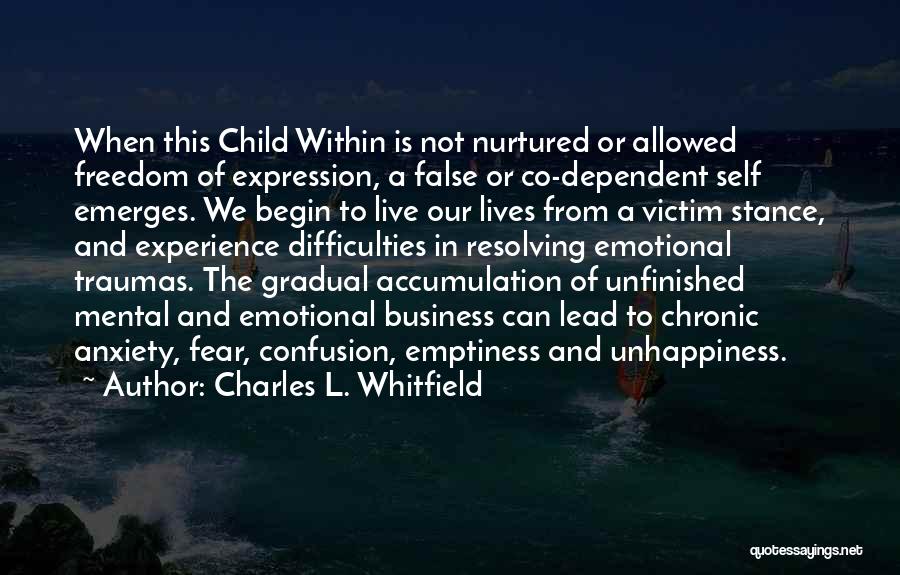
When this Child Within is not nurtured or allowed freedom of expression, a false or co-dependent self emerges. We begin to live our lives from a victim stance, and experience difficulties in resolving emotional traumas. The gradual accumulation of unfinished mental and emotional business can lead to chronic anxiety, fear, confusion, emptiness and unhappiness. — Charles L. Whitfield
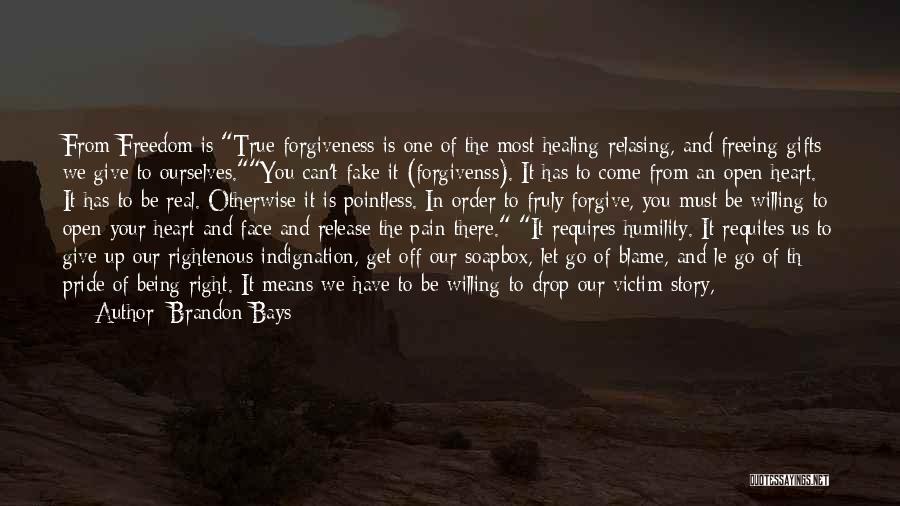
From Freedom is:
"True forgiveness is one of the most healing relasing, and freeing gifts we give to ourselves."
"You can't fake it (forgivenss). It has to come from an open heart. It has to be real. Otherwise it is pointless. In order to fruly forgive, you must be willing to open your heart and face and release the pain there."
"It requires humility. It requites us to give up our rightenous indignation, get off our soapbox, let go of blame, and le go of th pride of being right. It means we have to be willing to drop our victim story, soften our stance, and if necessary, let our heart be broken wide open." Brandon Bays Chapter 8 on forgiveness. — Brandon Bays
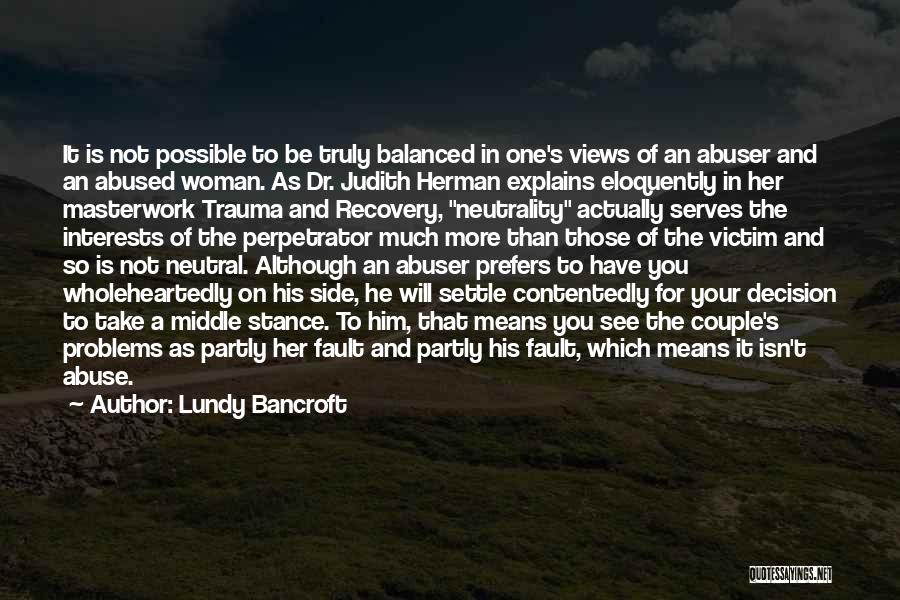
It is not possible to be truly balanced in one's views of an abuser and an abused woman. As Dr. Judith Herman explains eloquently in her masterwork Trauma and Recovery, "neutrality" actually serves the interests of the perpetrator much more than those of the victim and so is not neutral. Although an abuser prefers to have you wholeheartedly on his side, he will settle contentedly for your decision to take a middle stance. To him, that means you see the couple's problems as partly her fault and partly his fault, which means it isn't abuse. — Lundy Bancroft
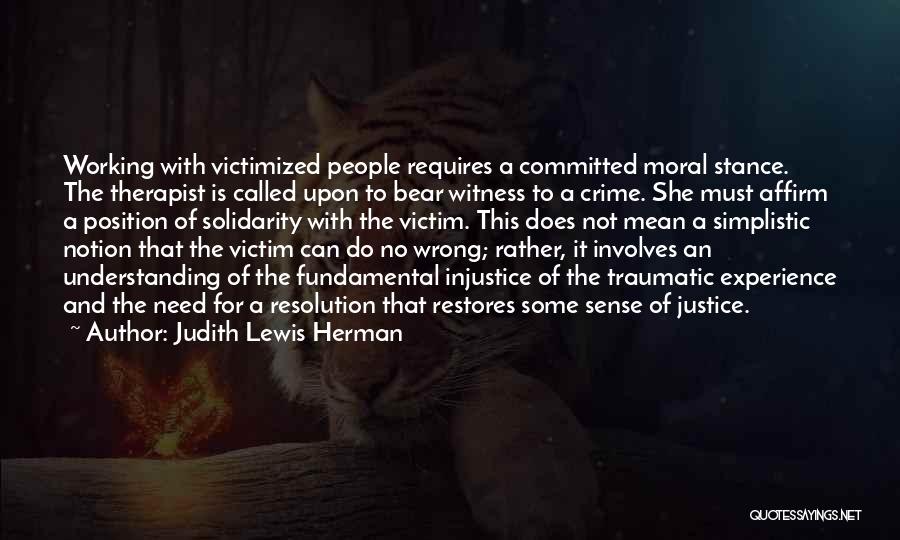
Working with victimized people requires a committed moral stance. The therapist is called upon to bear witness to a crime. She must affirm a position of solidarity with the victim. This does not mean a simplistic notion that the victim can do no wrong; rather, it involves an understanding of the fundamental injustice of the traumatic experience and the need for a resolution that restores some sense of justice. — Judith Lewis Herman
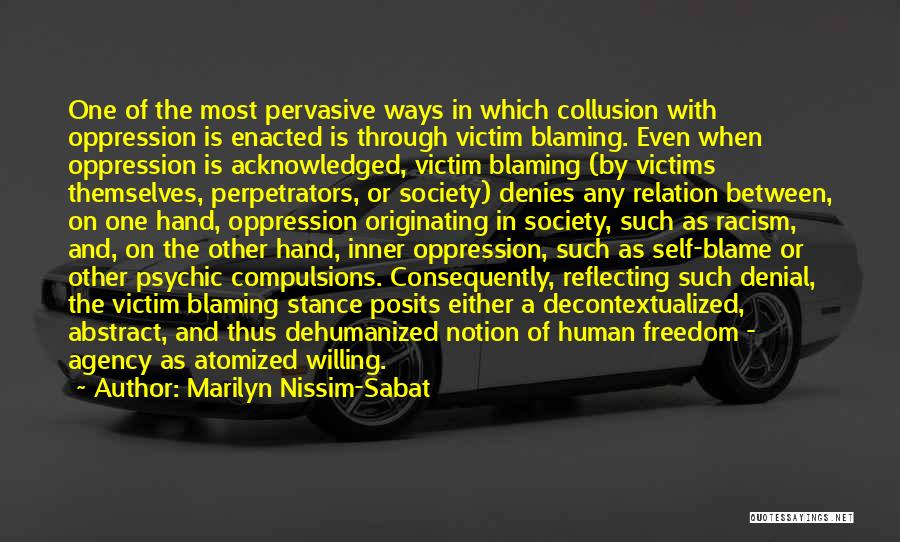
One of the most pervasive ways in which collusion with oppression is enacted is through victim blaming. Even when oppression is acknowledged, victim blaming (by victims themselves, perpetrators, or society) denies any relation between, on one hand, oppression originating in society, such as racism, and, on the other hand, inner oppression, such as self-blame or other psychic compulsions. Consequently, reflecting such denial, the victim blaming stance posits either a decontextualized, abstract, and thus dehumanized notion of human freedom - agency as atomized willing. — Marilyn Nissim-Sabat
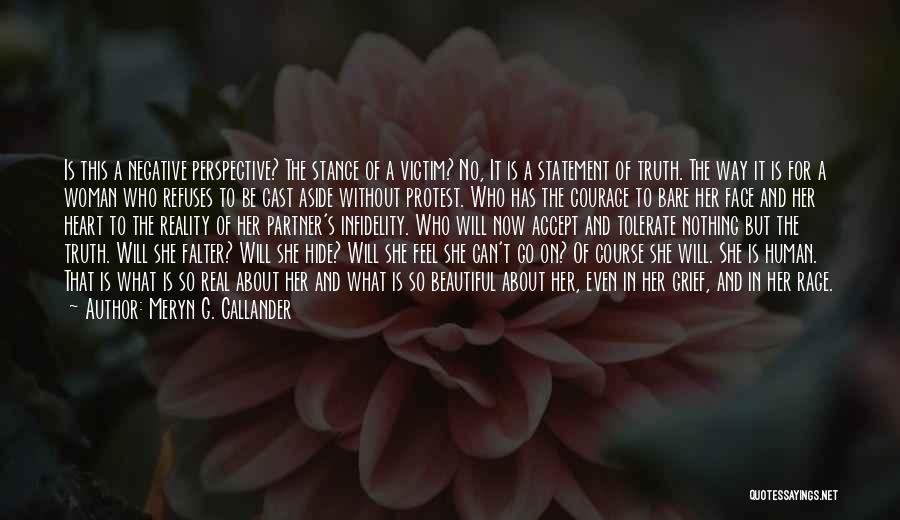
Is this a negative perspective? The stance of a victim? No, It is a statement of truth. The way it is for a woman who refuses to be cast aside without protest. Who has the courage to bare her face and her heart to the reality of her partner's infidelity. Who will now accept and tolerate nothing but the truth.
Will she falter? Will she hide? Will she feel she can't go on? Of course she will. She is human. That is what is so real about her and what is so beautiful about her, even in her grief, and in her rage. — Meryn G. Callander
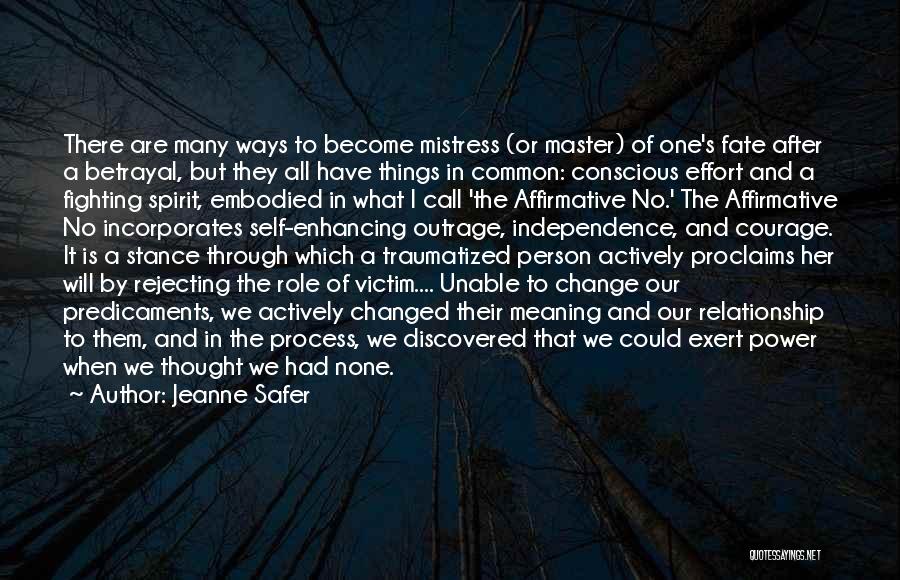
There are many ways to become mistress (or master) of one's fate after a betrayal, but they all have things in common: conscious effort and a fighting spirit, embodied in what I call 'the Affirmative No.' The Affirmative No incorporates self-enhancing outrage, independence, and courage. It is a stance through which a traumatized person actively proclaims her will by rejecting the role of victim.... Unable to change our predicaments, we actively changed their meaning and our relationship to them, and in the process, we discovered that we could exert power when we thought we had none. — Jeanne Safer
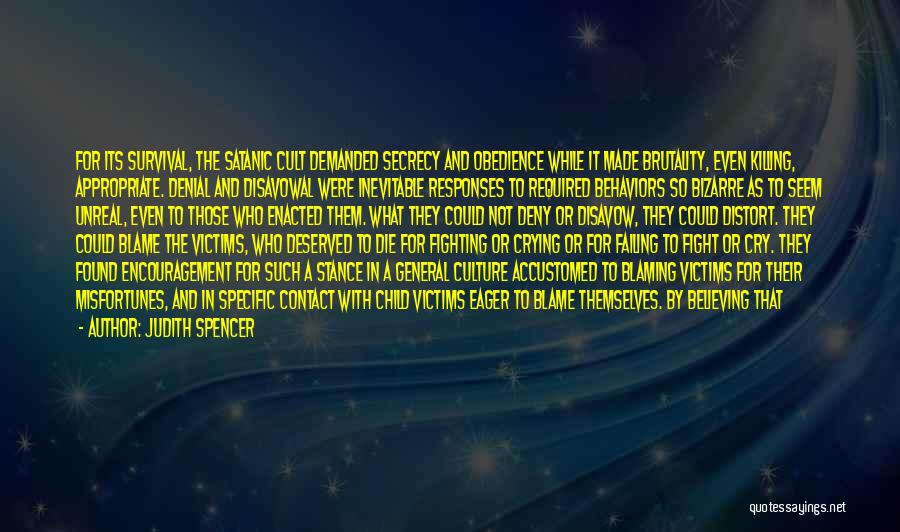
For its survival, the satanic cult demanded secrecy and obedience while it made brutality, even killing, appropriate. Denial and disavowal were inevitable responses to required behaviors so bizarre as to seem unreal, even to those who enacted them. What they could not deny or disavow, they could distort. They could blame the victims, who deserved to die for fighting or crying or for failing to fight or cry. They found encouragement for such a stance in a general culture accustomed to blaming victims for their misfortunes, and in specific contact with child victims eager to blame themselves. By believing that victims had a choice when there was none, they could see victims as culpable. They could even see the deaths as right and purposeful in the nobility of sacrifice. — Judith Spencer





